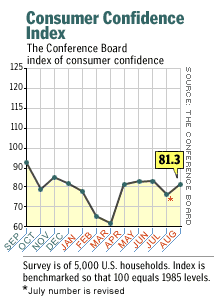NEW YORK (CNN/Money) -
The economic and financial costs to rebuild Iraq pale in comparison to the human costs, but they should not be ignored, according to some economists.
The United States got a grim reminder of the human cost Tuesday, when the number of U.S. service members killed in the "post-war" period in Iraq rose above the number killed before May 1, when President Bush declared major combat operations over.
Reflecting the financial cost of the war, the Congressional Budget Office released its projection for the 2004 federal budget deficit, saying it could be $480 billion, not including the billions of dollars it will cost to occupy and rebuild Iraq. Democrats and Republicans alike believe those costs are likely to widen the deficit to more than $500 billion, according to a Reuters report.

Harder to measure, however, are the general costs to business and consumer confidence of the war, which fit into a broader picture of a world still facing several hot spots, though the widespread "geopolitical uncertainty" that preceded the war with Iraq has lifted somewhat.
"The uncertainty is there. It's dissipated, but it's just below the surface and can be rekindled," said Delos Smith, senior economist at the Conference Board, a research group in New York that publishes a closely watched monthly survey of consumer confidence. "It plays a part in an economy full of very nervous people."
Smith said corporate confidence might also suffer, as companies that operate around the world have to spend more time and money on security. Corporate expansion and hiring are critical for economic growth now, since many analysts say the weak job market since the 2001 recession remains a threat to the world's largest economy.
Higher oil prices, driven in part by the difficulties in getting oil flowing from Iraq, also threaten to slow down the economy since they increase costs for businesses and consumers, said Kevin Logan, senior market economist at Dresdner Kleinwort Wasserstein. Iraq sits on the world's second-largest proven reserves of crude oil.
| Related stories
|

|
|
|
|
But Logan thought that was the only significant impact to the U.S. and global economies of the slow-burn post-war period and that investors in the financial markets, at least, are relieved things aren't worse than they might have been.
"Prior to the war, the stock market was at its lowest because people were pricing in a more intense military conflict, which hasn't happened," Logan said. "The market has decided that these events weren't nearly as damaging as they might have been to the global economy."
Consumers, too, might be better able to stomach continuing global uncertainty if job prospects pick up, as many economists think they eventually will.
After all, the world has always been a dangerous place, but it's a little bit safer if your paycheck enables you to buy bottled water, duct tape, a generator and other survival gear.
"It certainly affects psychology, but if the job market starts growing, that effect is far more important to psychology than something that's happening half a world away," said Sherry Cooper, chief economist at BMO Nesbitt Burns.

|

